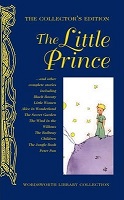Terry Pratchett, The Gods Trilogy
Hogfather (1996) **
A fortuitously-timed festive special at the chronological climax of my trilogy of trilogies, this was a thoughtful exploration of its theme as ever, once again let down by the need for actual plot. I'm even bored of the good characters now.
Arthur C. Clarke, Four Great SF Novels
The Deep Range (1957) ***
An improvement on the short story, the Stingray to his usual Thunderbirds makes a good case for aquatic SF. But I like space, me.
Dr. Seuss, A Classic Treasury
How the Grinch Stole Christmas! (1957) ***
Saved festively for last, but my Green Eggs and Ham-loving toddler decided she didn't have the cultural foundations to fully appreciate it yet. She said something along those lines, anyway. Its anti-corporate message could prove useful propaganda in the long term.
Various, The Little Prince and Other Stories
J. M. Barrie, Peter Pan (1911) ****
A random Disney film she's taken to, as a responsible parent I screened the source material to see how boring it would be as a future bedtime book. Fairly, but the psychoanalysis kept me interested, and it's less cynical escapism than Narnia.
William Shakespeare, The Illustrated Stratford Shakespeare
Much Ado About Nothing (1600) *
It took several aborted attempts and most of the year to make it through this tedious loveteam tangle, which doesn't even bother to rhyme most of the time. I'm not even halfway through the comedies yet.
Love's Labour's Lost (1598) **
Self-parodying sonnets and deliberately bad plays that you actually have to sit through.
A Midsummer Night's Dream (1605) **
A promising supernatural layer amounts only to temporary tomfoolery and the story accidentally ends a couple of acts too early.
The Chimes (1844) ****
A New Year special rather than a Christmas book, there are similar supernatural apparitions and sentimental premonitions to its better-known predecessor, tempered by multiple-choice ambiguity courtesy of madness, dying hallucinations or plain old dreaming.






